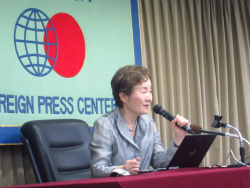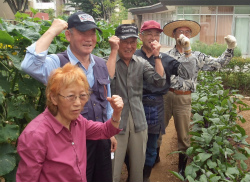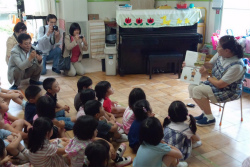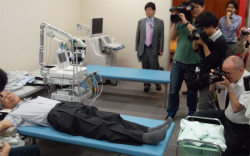Date : June 28 - July 3, 2012
Report: Press Tour “90-year life period, designing the model for Hyper-Aging Society: Aging in Place” (June 28 and July 3, 2012)
post date : 2013.08.23
Eighteen journalists from fourteen media organizations of Brazil, China, France, Germany, Republic of Korea, Russia, Singapore, Taiwan, and the United States participated in the press tour to cover the project aiming at establishing a model hyper-aging society, which is also said to be “the era of the 90-year life span.” In addition to the original one on June 28, a second tour was also organized on July 3 to accommodate the waiting-list applicants.
 The tour started with a briefing by Prof. Hiroko Akiyama, Institute of Gerontology, University of Tokyo, on the current situation of aging Japan and the elderly employment project, on which the university is working with Kashiwa City and the Urban Renaissance Agency (UR). Prof. Akiyama said that in 2030, one in three Japanese would be 65 years or older, and 20% would be 75 years or older, making Japan a hyper-aging county to an extent that no other country has experienced. Therefore, it is necessary to extend the period in which elderly people can live independently and to establish human bonds in local communities. She also described their project in Kashiwa City for achieving a sustainable aging society through such efforts as promoting second-life employment, which is expected to improve health and prevent the social isolation of elderly people.
The tour started with a briefing by Prof. Hiroko Akiyama, Institute of Gerontology, University of Tokyo, on the current situation of aging Japan and the elderly employment project, on which the university is working with Kashiwa City and the Urban Renaissance Agency (UR). Prof. Akiyama said that in 2030, one in three Japanese would be 65 years or older, and 20% would be 75 years or older, making Japan a hyper-aging county to an extent that no other country has experienced. Therefore, it is necessary to extend the period in which elderly people can live independently and to establish human bonds in local communities. She also described their project in Kashiwa City for achieving a sustainable aging society through such efforts as promoting second-life employment, which is expected to improve health and prevent the social isolation of elderly people.
 The tour participants then headed for Kashiwa City to see how second-life employment is taking shape. Toyoshikidai-danchi is a mega housing complex which once propped up Japan’s high economic growth, and is now under reconstruction at a fast pace. The ratio of the aged in the housing complex is already over 40%, and it shows what Japan will be like in a few more decades. In the Kohitsujien care home in Toyoshikidai-danchi, about 30 elderly people share such work as table-setting and gardening, and comfortably work twice a week on average. In an interview with the reporters they commented, “I have gotten healthy through working,” “Now I have a rhythm in my life.” The tour participants also covered elderly workers growing eggplants, cucumbers, and tomatoes in the garden of the care home.
The tour participants then headed for Kashiwa City to see how second-life employment is taking shape. Toyoshikidai-danchi is a mega housing complex which once propped up Japan’s high economic growth, and is now under reconstruction at a fast pace. The ratio of the aged in the housing complex is already over 40%, and it shows what Japan will be like in a few more decades. In the Kohitsujien care home in Toyoshikidai-danchi, about 30 elderly people share such work as table-setting and gardening, and comfortably work twice a week on average. In an interview with the reporters they commented, “I have gotten healthy through working,” “Now I have a rhythm in my life.” The tour participants also covered elderly workers growing eggplants, cucumbers, and tomatoes in the garden of the care home.
 In Kurumi Kindergarten, elderly people are working as “machi-no-sensei (town teachers),” who take care of children in non-regular hours such as early morning and late afternoon, and read books to the children. One of the elderly explained how the employment had changed her state of mind, by saying that she feels it is like coming out of a world of black-and-white into the colorful world of movies.
In Kurumi Kindergarten, elderly people are working as “machi-no-sensei (town teachers),” who take care of children in non-regular hours such as early morning and late afternoon, and read books to the children. One of the elderly explained how the employment had changed her state of mind, by saying that she feels it is like coming out of a world of black-and-white into the colorful world of movies.
 The University of Tokyo Kashiwa Campus is conducting a follow-up survey on the impact of the employment of elderly people on their brains, blood vessels, cognitive functions, and muscles. After the briefing on how their life rhythm and frequency of going out had changed after employment, based on their diaries, the tour participants were shown a demonstration of blood vessel examination on a working elderly person.
The University of Tokyo Kashiwa Campus is conducting a follow-up survey on the impact of the employment of elderly people on their brains, blood vessels, cognitive functions, and muscles. After the briefing on how their life rhythm and frequency of going out had changed after employment, based on their diaries, the tour participants were shown a demonstration of blood vessel examination on a working elderly person.



